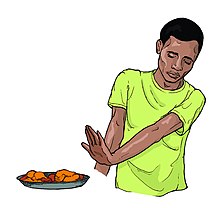| Anorexia | |
|---|---|
 | |
| Specialty | Family medicine, Internal medicine |
| Symptoms | Not wanting to eat, no hunger, dizziness, weakness |
Anorexia is a medical term for a loss of appetite. While the term outside of the scientific literature is often used interchangeably with anorexia nervosa, many possible causes exist for a loss of appetite, some of which may be harmless, while others indicate a serious clinical condition or pose a significant risk.
Anorexia is a symptom, not a diagnosis.
The symptom also occurs in other animals, such as cats,[1][2] dogs,[3][4] cattle, goats, and sheep.[5] In these species, anorexia may be referred to as inappetence. As in humans, loss of appetite can be due to a range of diseases and conditions, as well as environmental and psychological factors.[2][4]
- ^ Chan, Daniel L. (November 1, 2009). "The Inappetent Hospitalised Cat: Clinical Approach to Maximising Nutritional Support". Journal of Feline Medicine and Surgery. 11 (11): 925–933. doi:10.1016/j.jfms.2009.09.013. PMID 19857855. S2CID 20998698.
- ^ a b "Anorexia". Cornell Feline Health Center. Cornell University. 16 October 2017. Retrieved July 19, 2020.
- ^ Carrozza, Amanda; Marks, Stanley (November 20, 2018). "NY Vet: The Best Approach to Treating Inappetence". American Veterinarian. Archived from the original on July 19, 2020. Retrieved July 19, 2020.
- ^ a b Llera, Ryan; Downing, Robin. "Anorexia in Dogs". VCA Animal Hospital. Archived from the original on July 19, 2020. Retrieved July 19, 2020.
- ^ Jubb, Tristan; Perkins, Nigel. "Inappetence/Inanition". Veterinary Handbook for the Livestock Export Industry. Australian Livestock Export Corporation, Meat & Livestock Australia. Archived from the original on July 19, 2020. Retrieved July 19, 2020.